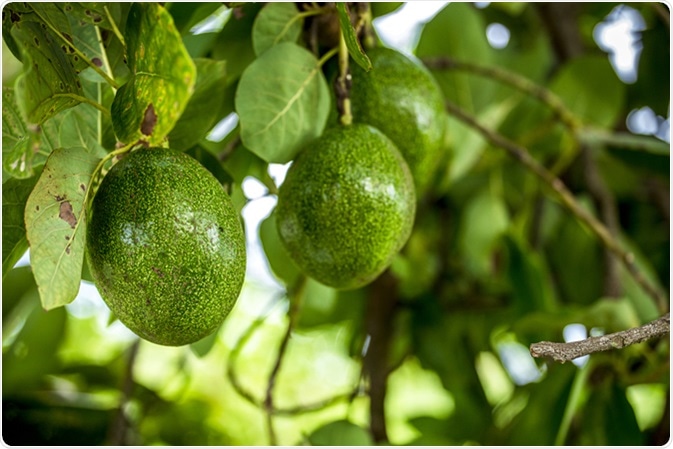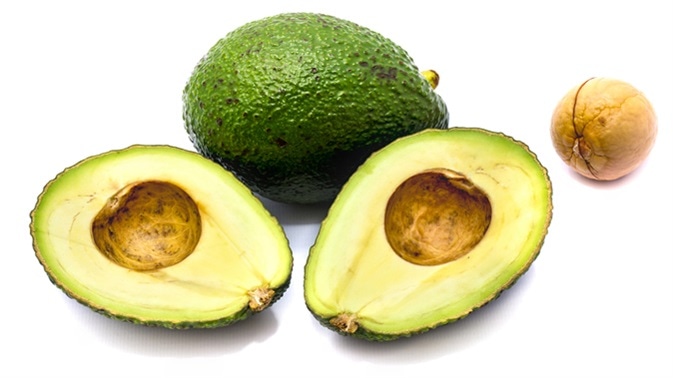Avocado refers to the fruit of the avocado tree (Persea americana), which is botanically a large berry containing a single large seed.

The avocado (Persea americana) is a tree that is native to South Central Mexico, classified as a member of the flowering plant family Lauraceae. Image Credit: Ninja Artist / Shutterstock
The following are some of the most obvious advantages of including avocados regularly in the diet. This is rendered easier by the mild neutral flavor and creamy consistency, which lend themselves to its use in many diverse forms, including a dip, a spread, a thickener, a smoothie or a salad.
Nutrient Density
Avocados are nutrient rich, that is, they provide a significant percentage of daily requirements of vitamins, minerals, antioxidants and other nutrients in association with much fewer calories than many other foods. It is estimated that one avocado supplies almost 20 nutrients outside the main food groups of protein, carbohydrates and fats, at just 240 calories. Thus, just a half avocado is sufficient for one helping of a healthy meal.
Unsaturated Fats
It is established that poly- and mono-unsaturated fats can be substituted for saturated fats, such as beef tallow, lard and butter, to reduce the total dietary cholesterol levels. They are therefore often promoted as an essential part of a healthy diet (though this is based upon the fear that cholesterol in the diet translates into blood cholesterol, which is not true). Avocados are particularly rich in monounsaturated and polyunsaturated fat (which constitute 15% and 3% of its composition respectively) and may be unique among fruits in this respect. They are therefore important in promoting intake of these unique and health-promoting nutrients.

Sugar-Free
Low sugar intakes can help reduce excessive energy ingestion, which is a risk factor for many metabolic conditions, such as obesity, diabetes and coronary heart disease. Avocados are sugar-free and also have no cholesterol or sodium.
Vitamin Supply
Avocados supply valuable amounts of vitamins and minerals by themselves, and their high fat content also helps to boost the intestinal absorption of fat-soluble vitamins such as vitamin A, D, E and K, all of which play vital roles in health and healing.
Complementary and Weaning Food
The lack of sweetness, but naturally pleasant taste, with the creamy texture, means that it can be introduced to babies who are being weaned, without teaching their developing tastes that “sweet” means “edible”, unlike apples and bananas. The fiber content also aids in preventing constipation. The high fat content helps to maintain the high rate of growth in young babies.
Gut Health
Avocado, being a rich source of dietary fiber, promotes gut motility and proper bowel movements, as well as improves cardiovascular health by inducing feelings of satiety and reducing overall energy intake. Fiber-rich foods also prevent diabetes and obesity. One medium avocado can supply one-third of the daily fiber requirement all by itself.
High Lutein Levels
Currently, lutein is arousing much interest, because of its potent antioxidant action and neurodevelopmental as well as neuroprotective actions in the human body. Avocados contain the highest concentration of lutein among many common fruits in the US. They also contain betasitosterol, which inhibits the absorption of cholesterol from other foods.
Folate Source
Avocados supply about 15% of one day’s requirement of folic acid per serving (about a third of an avocado, approximately 50g in weight). Folic acid is essential for cell maturation, and its deficiency causes several conditions. In pregnancy, lack of adequate folic acid levels increases the risk of spinal and other neural tube defects, such as meningomyelocele. Folate deficiency also predisposes to homocystinuria, which increases the risk of coronary heart disease.
Other Vitamins
Pantothenic acid and vitamin K are other vitamins, which are available in high amounts in avocado. Vitamin K is involved in the coagulation cascade and may prevent osteoporosis in older people. Riboflavin or vitamin B2 is a part of two important coenzymes, namely, flavin mononucleotide and flavin adenosine dinucleotide. Their deficiency affects energy metabolism, many biosynthetic pathways, and cellular growth and development. Vitamin E, vitamin B6 or pyridoxine, vitamin C or ascorbic acid, thiamine or vitamin B1 are also other important vitamins naturally found in avocados.
Other Minerals
Copper is abundant in avocados, and one serving supplies 10% of daily requirements. Copper has a diversity of functions in the body, ranging from hematopoiesis, vascular health, immunity and neurologic health, to bone density. Potassium, iron, magnesium, and manganese are also present in smaller amounts, and participate in blood formation, neurotransmission, and bone health, among other functions.
Antioxidants
Lutein and zeaxanthin are two antioxidants that participate in a host of normal physiological reactions. Lutein is thought to prevent macular degeneration with advancing age, to reduce the progression of cataracts, and maintain skin texture. Avocados contain much of both these carotenoids compared to any other fruit or vegetable. They are also rich in glutathione, which makes up a vital part of many antioxidant enzyme systems.
The Final Word
In conclusion, making avocados a regular part of the diet when in season confers a dietary superiority, as well as supplying a better nutritional profile. This adds up to a lower risk of developing metabolic syndrome and strengthening overall health with a multitude of essential nutrients.
Further Reading
Last Updated: Feb 26, 2019